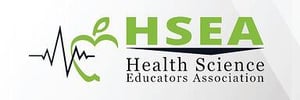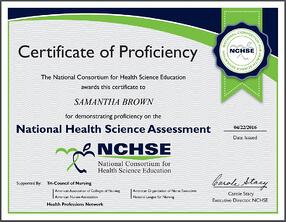What Is the National Consortium for Health Science Education (NCHSE)?
For nearly 10 years, Bri has focused on creating content to address the questions and concerns educators have about teaching classes, preparing students for certifications, and making the most of the iCEV curriculum system.
The National Consortium for Health Science Education (NCHSE) is a partnership of educators, professionals, and organizations focused on improving health science education across the United States.
Overall, NCHSE’s mission is to “stimulate creative and innovative leadership for ensuring a well-prepared health workforce.”
NCHSE is working towards that goal by providing resources to health science educators to help students prepare for their careers.
On this page, we’ll dive into the three ways NCHSE supports health science education:
- Benefits for members
- National Health Science Standards
- National Health Science Assessment
Let’s start with the general benefits members receive!
1. Benefits for NCHSE Members

NCHSE has three levels of membership:
- Group Membership for Organizations & Institutions
- Publishers & Resources Coalition
- Individual Teachers via the Health Science Educators Association
The first two membership areas are focused on bringing organizations who support health science education together to improve CTE health science programs as a whole.
To address the struggles individual health science instructors faced in the classroom, NCHSE created an option for teachers: the Health Science Educators Association (HSEA).
The HSEA connects individual health science instructors to the knowledge and resources that NCHSE has available.
Any health science teacher can apply to become a member of the HSEA by filling out the application. In addition, to remain part of the association, teachers much pay the annual membership fee.
Once they are part of the association, teachers receive:
- A compilation of curriculum resources from NCHSE
- Professional development opportunities
- Access to an online database of additional resources
- Discounts on products
- Quarterly webinars
- A membership certificate
NCHSE members also have opportunities to attend events and meetings throughout the year. The one that instructors most look forward to is the National Health Science Conference.
This conference is unique because it is 100% focused on health science education.
However, teachers who are not members can benefit from some big initiatives that NCHSE has taken on, including the National Health Science Standards.
2. What Are the National Health Science Standards?

To help create consistency in health science programs across the United States, NCHSE has developed what is referred to as the National Health Science Standards.
These standards represent skills and knowledge that any student should know in order to enter the health care field -- no matter which health care pathway they pursue.
The standards are broken into 11 overarching areas called foundation standards:
- Academic Foundation
- Communications
- Systems
- Employability Skills
- Legal Responsibilities
- Ethics
- Safety Practices
- Teamwork
- Health Maintenance Practices
- Technical Skills
- Information Technology in Healthcare
Each of the foundation standards are further broken into sub-areas that relate to specific skills and abilities all health care workers are expected to have.
Overall, these standards were created by NCHSE for three specific reasons.
First, clear expectations tell students what they need to learn to reach their future employment goals.
Second, teachers can create a consistent curriculum to prepare their students for the workforce.
Some states have clearly defined course standards for their CTE health science programs, making it a snap for teachers to lay out their syllabus.
Other instructors aren’t quite as lucky. Many states don’t have consistent course standards, which means those teachers are forced to figure out what students need to know and then build their curriculum from scratch.
Finally, the nation as a whole benefits from a more consistent healthcare experience. When students across the country are required to learn all of the same information, it leads to more consistency and a better prepared healthcare workforce.
In a nutshell, the National Health Science Standards benefit everyone!
But even if you plan your lessons according to the standards, how can you be sure your students have retained the knowledge?
That’s where the National Health Science Assessment comes in.
3. NCHSE’s National Health Science Assessment

Students put their health care knowledge to the test (literally) by taking the National Health Science Assessment.
The assessment is designed as an end-of-program exam, taking multiple years of health science education into account.
If a student passes the exam, they earn a certificate that recognizes they do have the appropriate foundational skills for a career in health care.
With that in mind, it’s important to note that the National Health Science Assessment certificate is not a right-to-work credential or certification.
In order for students to enter into specific careers, they may need to take additional industry certification exam such as those through the National Healthcareer Association (NHA).
The exam is administered by Precision Exams, a well-known provider of industry certifications for career and technical education.
To help educators and students navigate the ins and outs of the assessment, NCHSE and Precision Exams have a number of resources including:
In addition to these assessment-specific resources, NCHSE has developed a health science curriculum enhancement package filled with extra materials any health science teacher could implement in the classroom.
While this is an invaluable resource to help students seeking the certification, it does come with a hefty price tag ranging from $350-$500.
Altogether, finding a balance between your membership dues, your traditional classroom resources, and additional certification prep materials isn’t easy.
That’s why many health science instructors have begun switching to a system they can use both for certification prep and teaching everyday classes!
How HealthCenter21 helps with NCHSE Exam Prep and Beyond!
Health science instructors across the country have added HealthCenter21 as a primary instructional resource to prepare students for the national assessment.
HealthCenter21 is an online system built to empower you to help your students succeed in the classroom and the workforce.
This is made possible with hundreds of ready-to-use instructional resources, classroom management tools, assessments, student tracking, and more.
At AES, we created HealthCenter21 to help you prepare students for success in the classroom, pass certifications, and become the next generation of health care workers.
As part of the NCHSE Publishers Coalition, we used the National Health Science Standards as guidance when developing our curriculum.
When the standards change, we review HealthCenter21 and make updates when needed. That ensures your students are receiving the most up-to-date information when it comes to the health care industry.
Plus, because the standards line up with the National Health Science Assessment, HealthCenter21 is an excellent resource for exam prep!
Want to learn more about using HealthCenter21 to prepare your students for the NCHSE exam and their future careers?
Click below to download the guide for using HealthCenter21 to prep students for the NCHSE assessment:


